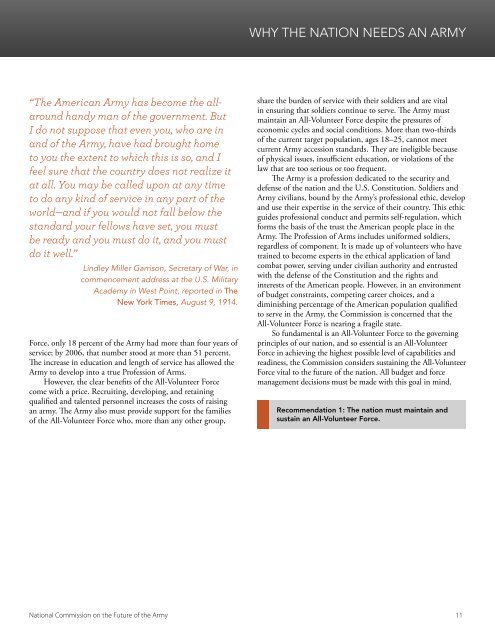THE FUTURE OF THE ARMY
Futurearmy
Futurearmy
You also want an ePaper? Increase the reach of your titles
YUMPU automatically turns print PDFs into web optimized ePapers that Google loves.
WHY <strong>THE</strong> NATION NEEDS AN <strong>ARMY</strong><br />
“The American Army has become the allaround<br />
handy man of the government. But<br />
I do not suppose that even you, who are in<br />
and of the Army, have had brought home<br />
to you the extent to which this is so, and I<br />
feel sure that the country does not realize it<br />
at all. You may be called upon at any time<br />
to do any kind of service in any part of the<br />
world—and if you would not fall below the<br />
standard your fellows have set, you must<br />
be ready and you must do it, and you must<br />
do it well.”<br />
Lindley Miller Garrison, Secretary of War, in<br />
commencement address at the U.S. Military<br />
Academy in West Point, reported in The<br />
New York Times, August 9, 1914.<br />
Force, only 18 percent of the Army had more than four years of<br />
service; by 2006, that number stood at more than 51 percent.<br />
The increase in education and length of service has allowed the<br />
Army to develop into a true Profession of Arms.<br />
However, the clear benefits of the All-Volunteer Force<br />
come with a price. Recruiting, developing, and retaining<br />
qualified and talented personnel increases the costs of raising<br />
an army. The Army also must provide support for the families<br />
of the All-Volunteer Force who, more than any other group,<br />
share the burden of service with their soldiers and are vital<br />
in ensuring that soldiers continue to serve. The Army must<br />
maintain an All-Volunteer Force despite the pressures of<br />
economic cycles and social conditions. More than two-thirds<br />
of the current target population, ages 18–25, cannot meet<br />
current Army accession standards. They are ineligible because<br />
of physical issues, insufficient education, or violations of the<br />
law that are too serious or too frequent.<br />
The Army is a profession dedicated to the security and<br />
defense of the nation and the U.S. Constitution. Soldiers and<br />
Army civilians, bound by the Army’s professional ethic, develop<br />
and use their expertise in the service of their country. This ethic<br />
guides professional conduct and permits self-regulation, which<br />
forms the basis of the trust the American people place in the<br />
Army. The Profession of Arms includes uniformed soldiers,<br />
regardless of component. It is made up of volunteers who have<br />
trained to become experts in the ethical application of land<br />
combat power, serving under civilian authority and entrusted<br />
with the defense of the Constitution and the rights and<br />
interests of the American people. However, in an environment<br />
of budget constraints, competing career choices, and a<br />
diminishing percentage of the American population qualified<br />
to serve in the Army, the Commission is concerned that the<br />
All-Volunteer Force is nearing a fragile state.<br />
So fundamental is an All-Volunteer Force to the governing<br />
principles of our nation, and so essential is an All-Volunteer<br />
Force in achieving the highest possible level of capabilities and<br />
readiness, the Commission considers sustaining the All-Volunteer<br />
Force vital to the future of the nation. All budget and force<br />
management decisions must be made with this goal in mind.<br />
Recommendation 1: The nation must maintain and<br />
sustain an All-Volunteer Force.<br />
National Commission on the Future of the Army 11


